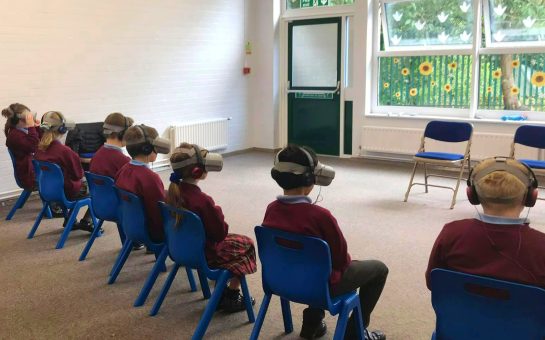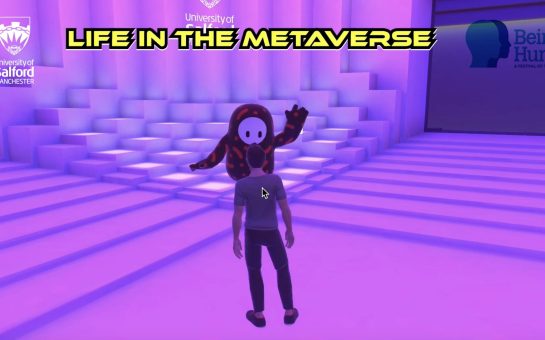If Gamescom is a barometer of up and coming technology then you have to say that Virtual Reality (or VR as it is often referred as) is something that you can’t deny is the future of gaming.
Admittedly still in its infancy, VR divides opinion and opens up a whole new level of competition among developers in a battle to be the first to nail the immersive experience.
MM used Gamescom to try out a plethora of the new tech to give a verdict of just where Virtual Reality finds itself in 2018.
Reality Magiq:
Our first venture into the world of VR came from an independent company from Korea called Reality Magiq who introduced us to some of their VR technology with various game modes to choose from.
Aiming to “create state of the art quality games to deliver hyper realistic user experiences with highly sensitive haptic response and virtual designs” we tried their sci-fi FPS title named Infinite Fire.
Equipped with what could only be described as a vibrating vest, two controllers and of course a VR headset, we were launched into a 360 degree arena with continuous spawning enemies coming at you with all angles.
Incorporating elements of a traditional style RPG, Infinite Fire took some time to adapt to given the fact you were unable to see the controllers in your hands and quite frankly having no bearing of where and what you were looking at.
Once we had got past the stage of holding two guns in our hands, the game began with teleporting quickly becoming a key part of taking out your highlighted enemies.
Although impressive in its immersion, it was quite obvious that the game still lacked certain elements that would help you detach yourself from the real world.
With a distinct lack of coordination with your VR headset on, there was still a need for a lot of help from peers outside of you to gain control of your weapons. (see main pic)
A good effort but needed some work.
Garlic Games Media:
MM couldn’t go to Germany’s gaming convention without seeing what the locals could conjure up on the technological front and the peculiarly named Garlic Games gave us that opportunity.
Connecting a sensor to your feet as well as your two hands and your head, the game focused on the simple yet very familiar act of picking up, placing and kicking a ball into targets in front of you.
Trying to nail the real life sensation of kicking a football, the game’s immersion was impressive given the simplicity of what was at hand although finding the correlation between how hard you swing your foot and how much power you generate was still a little awry.
Speaking to creative director Bengt-Oliver Stellmann about his creation and the long term aim with the technology, he told us: “I think you have seen with other virtual reality technology around that we are all dealing with the same tools but choosing to execute it differently.
“It’s a challenging market but one we are keen to partake in as VR is still a work in progress.”
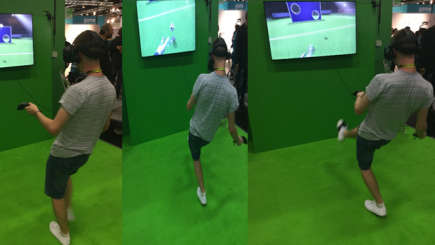
Oculus:
Having tested two independent strands of VR, we turned our attention to one of the leading brands of VR in Oculus and the new package technology companies are looking to distribute in the near future.
We got our hands on some of their latest technology through an immersive game called Space Junkies which, to harden gamers, would be best to describe as low budget version of popular Xbox title Halo incorporated into a VR setting.
Experiencing a small multiplayer game mode with 3 other competitors, we were able to take an online arena in VR equipped with a shield, gun and jet pack.
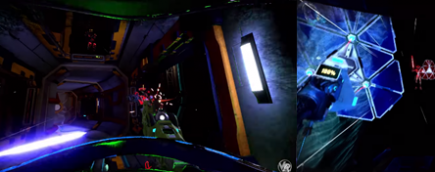
The experience was relatively smooth and genuinely something that has so much potential.
Accessing weapons by physically pulling guns out by your side and reloading whilst shaking your controller, it could only be described as a game that combines features of all major consoles into one big package which is exciting for the future of gaming.
Of course it did have its faults, and was far from perfect, but it was no surprise that this technology was a market leader given the barriers it has broken down that perhaps its competitors haven’t.
A serious one to watch.
PlayStation VR:
Finally we had to give a word to PlayStation and its continued plight to integrate into the VR market and make it more accessible in the immediate future for gamers.
Despite being predominantly known for its console classics over the years, PlayStation VR gave gamers some insight into what they could be getting their hands on in the next year.
Although a range of titles were on offer, we tried Firewall Zero Hour, a high tempo, tactical team based military shooter.
Seemingly taking inspiration from the style of play adopted by Tom Clancy’s Rainbow Six series, you are armed with weapons alongside your fellow teammates intently listening for the footsteps of your enemies in what can only be described as a tense combat experience.
Although the accuracy can feel a little laboured, there is no doubt that PlayStation have invested in an immersive experience and done so on a platform that can hit shelves sooner rather than later.
A quick fix but already very accessible.
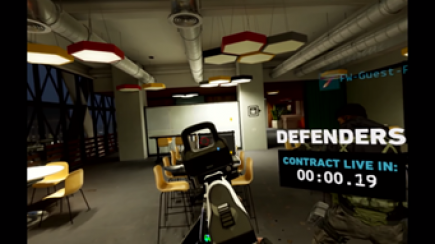
The Verdict:
Despite playing various tiers of VR technology, there is no evidence to say that anyone has nailed it just yet.
The environment developers find themselves in means playing games independently is justifiably very important and VR still involves so much help from people next to you as operating equipment you can’t see whilst playing is unsurprisingly difficult to play by yourself.
The technology involves a lot of equipment and is still impractical to have in your living room per say but it’s safe to say it’s on its way to become that for users.
Simply put, watch this space.
